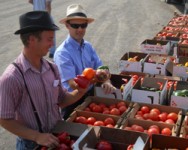Event Details
Date
January 3, 2019
Time
8:30 AM - 3:00 PM
Location
Finger Lakes Produce Acution
3691 NY-14A
Penn Yan, NY 14527
Cost
This event is free.
Host
Cornell Vegetable ProgramJudson Reid
585-313-8912
email Judson Reid
Finger Lakes Produce Auction Educational Meeting
January 3, 2019
This meeting is our annual winter educational event for Finger Lakes Produce Auction growers. This year we focus on disease management in cole crops, strawberries, food safety and greenhouse flowers. 2.0 recertification credits in private vegetable category.
8:30am Registration and sign in for pesticide credits
9:00 Harvey Leid -- Welcome and Auction Update
9:10 GAPs vs FSMA and On Farm Readiness Reviews -- Steve Shirmer, NYS Department of Ag and Markets
9:30 Vegetable Crops Disease and Pest Update -- Judson Reid, CCE Cornell Vegetable Program
10:00 Break
10:15 Weaverland Produce Auction Grower Panel
11:00 Basics of Plant Breeding and Brassica Variety Selection as a Disease Control Strategy -- Dennis Ferlito, Bejo Seeds
11:30 Brassica Disease Overview Featuring 2018 Trial Results for Control of Alternaria Leaf Spot and Head Rot in Broccoli -- Christy Hoepting, CCE Cornell Vegetable Program
12:00 Lunch break
1:00 Strawberry Establishment and Production for Auction Growers -- Esther Kibbe, CCE Harvest NY
1:45 Thrip and Whitefly Greenhouse Management for Bedding Plants, Vegetable Transplants and High Tunnel Tomatoes -- John Sanderson, Entomology, Cornell University
2:20 Growing Flowers for Market: A Grower's Perspective -- Eugene Hoover
2:45 Follow-up question and answer period -- all speakers
3:00pm Participants receive pesticide credit certificates and depart



































